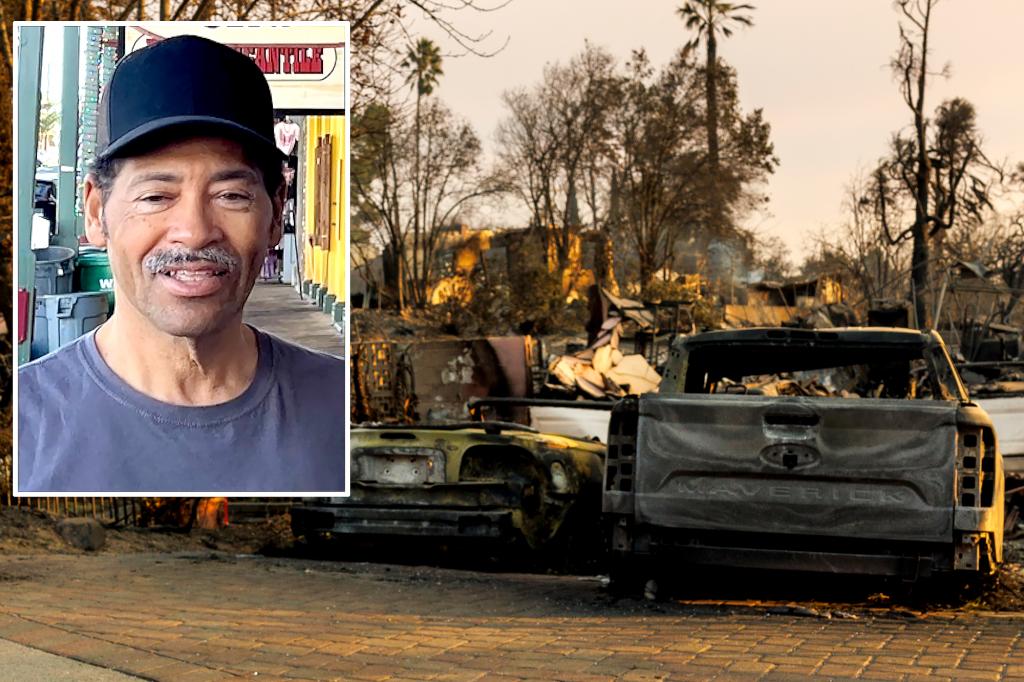The devastating Eaton Fire in Southern California tragically claimed the life of Victor Shaw, a 66-year-old man who perished while attempting to defend his family home with a garden hose. His sister, Shari Shaw, recounted the harrowing final moments she shared with her brother as she desperately tried to convince him to evacuate their Altadena bungalow on Monterosa Drive. Awakened by Shari’s frantic pleas and the encroaching flames, Victor, hampered by diabetes and chronic kidney disease, resisted leaving, expressing his desire to protect the home he had inhabited since 1965. Despite Shari’s persistent urging, Victor remained behind as she fled to safety, witnessing the house erupt in flames as she escaped. A family friend later discovered Victor’s body on the side of the road, still clutching the garden hose, a poignant testament to his final act of defiance against the inferno.
Shari’s attempts to rouse her brother were met with resistance, as Victor, groggy from sleep, initially downplayed the imminent danger. The fire, rapidly descending from the nearby mountain, engulfed the cul-de-sac where their home stood. Shari’s increasingly desperate calls to evacuate were met with Victor’s insistence on staying put, a decision that would ultimately cost him his life. Despite her own fear and the swirling embers that threatened her safety, Shari made repeated attempts to persuade her brother, but to no avail. Haunted by the image of her brother’s final moments, Shari expressed her anguish at being unable to save him, a sentiment that underscores the profound loss and the agonizing helplessness felt by those who witnessed the fire’s devastation.
The fire’s rapid advance and the intensity of the heat and smoke ultimately overwhelmed Victor. His body was found clutching the garden hose, a symbol of his valiant, yet futile, attempt to save his home. The image of Victor’s final moments serves as a chilling reminder of the destructive power of wildfires and the tragic consequences that can befall those who choose to stay behind. The medical examiner confirmed that Victor succumbed to smoke inhalation and thermal injuries, a grim testament to the inferno’s intensity. Shari’s recounting of the events paints a vivid picture of the chaos and terror that gripped the residents of Monterosa Drive as the fire swept through their neighborhood.
The Eaton Fire, igniting on a Tuesday afternoon, rapidly spread through the dry brush, claiming at least six lives, including Victor’s. The fire scorched over 14,000 acres, leaving a path of destruction in its wake. Containment efforts proved challenging, with only three percent of the fire contained by Friday night. The Eaton Fire was not the only blaze wreaking havoc in the Los Angeles area. Concurrently, the Palisades Fire raged to the west of Los Angeles, burning over 21,000 acres and claiming at least five lives. Both fires decimated over 10,000 structures, leaving countless residents displaced and grieving the loss of their homes and loved ones.
Among the victims of the Palisades Fire was 85-year-old Annette Rossilli, who perished alongside her beloved pets. Despite pleas from her caregiver to evacuate, Rossilli refused to abandon her home and her animal companions, a dog, canary, two parrots, and a turtle. Firefighters discovered her remains inside her car, a tragic end to a life dedicated to her pets and her home. Rossilli’s story, like Victor’s, highlights the complex and often heartbreaking decisions faced by residents in the path of wildfires. The bond between humans and animals, the attachment to home, and the unwavering hope that the fire will spare one’s property often override the instinct for self-preservation.
These two devastating fires, the Eaton Fire and the Palisades Fire, underscore the increasing threat of wildfires in California, fueled by drought conditions and rising temperatures. The stories of Victor Shaw and Annette Rossilli exemplify the tragic consequences that can result from these infernos. Their deaths serve as a somber reminder of the importance of heeding evacuation orders and prioritizing personal safety during such emergencies. As firefighters continue their tireless efforts to contain these blazes, the communities affected grapple with the immense loss and begin the long, arduous process of recovery. The scars left by these fires, both physical and emotional, will undoubtedly remain for years to come.

